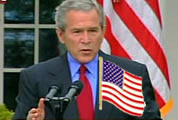A Russian friend would periodically make the case that his native language is more expressive than English and, I have to admit, when he rolled out his examples, I was impressed. They were masterpieces of concision and wit.
But in my heart of hearts I knew my mother tongue was pretty damn good—precise when it needs to be, vague when clarity is uncalled for, and funny in percussive, sonically economical ways.
For instance, a recent article at the wonderful site World Wide Words is devoted to the phrase: “… couldn’t organize a two-car funeral” (i.e., is hopelessly incompetent). The key element is, of course, the final triad: two-car funeral. What makes it great? Among other things, it’s the rhythm: DA DA DA-duh-duh—three punchy stresses before the phrase tails off in disgust. Then there’s the use of percussives often associated with foul language—k’s and f’s, in particular. The idea that a funeral revolves around cars (and the number of them) strikes me as peculiarly American.
For some reason, we seem to have a lot of expressions for incompetence: “doesn’t know his ass from a hole in the ground” (or “… from his elbow”), “couldn’t find his ass in the dark” (or “… with both hands,” or—drumroll, please— “… in the dark with both hands”). I’m sure there are many others that don’t involve the ass, or arse, as the Brits would say—I just can’t think of them offhand.*
Speaking of trans-Atlantic variations, the proprietor of World Wide Words, Michael Quinion, concludes his analysis of “two-car funeral” by supplying the British version, which he says is more forceful: “… couldn’t organise a piss-up in a brewery.” Americans always have to remind themselves that when Brits say “piss,” they don’t mean “pee.” Pissed is drunk, as in the Monty Python classic, “The Bruces’ Philosophers Song” :
Yes, Socrates himself is particularly missed,
A lovely little thinker but a bugger when he’s pissed.
Oh, and bugger means something else over there as well. Two countries divided by a common language indeed.
__________
* “… has his head up his ass”—wait, that has ass in it. Hmm. This is harder than I thought. Reminds me of the episode of Fawlty Towers where the irate American tourist advises Basil, who is supposedly having problems with his chef, to go into the kitchen and “lay it on the line—tell him you’ll bust his ass!” It’s not the first time the American used the term, which leads Basil to observe under his breath: “Everything’s bottoms with you people.”

 If you really love your country, you wear a flag lapel pin, just like our President does. If you don’t wear one … well, we can draw our own
If you really love your country, you wear a flag lapel pin, just like our President does. If you don’t wear one … well, we can draw our own 